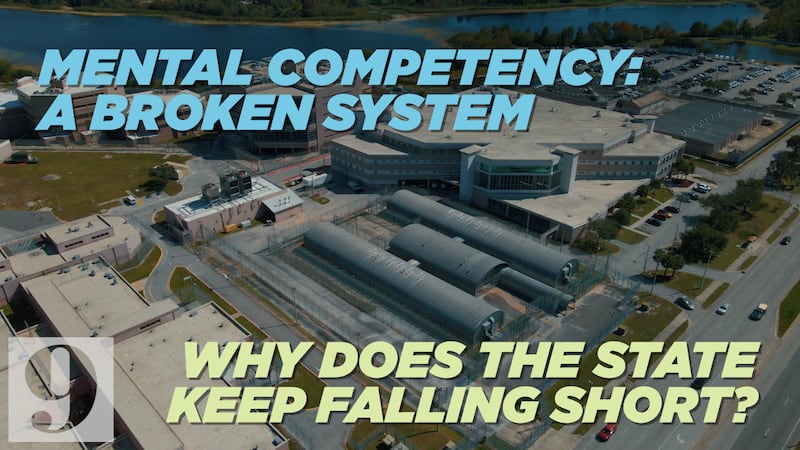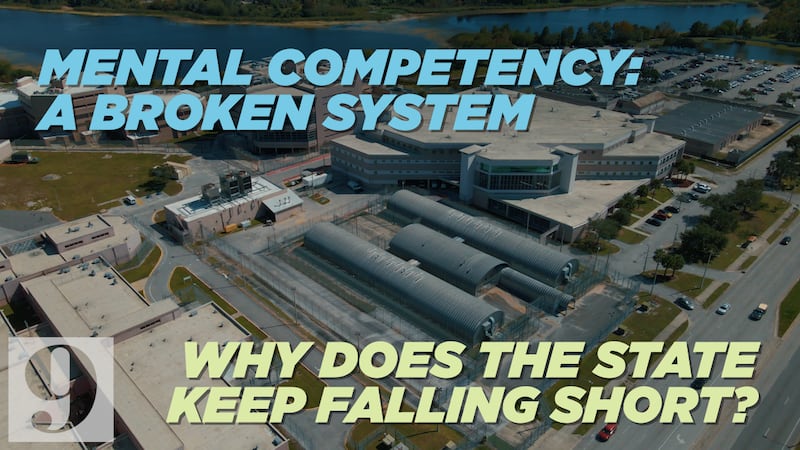ORLANDO, Fla. — Changes were just made to Florida law aimed at improving the mental health treatment for defendants found incompetent to stand trial for their alleged crimes.
▶ WATCH CHANNEL 9 EYEWITNESS NEWS
It comes as 9 Investigates found the state has been breaking its own law on how quickly those people are supposed to receive treatment.
Investigative reporter Karla Ray took tough questions to those involved in the system and found even when those defendants have stabilized they often get caught in a revolving door while awaiting trial.
“We were very close. I mean, we really liked being around each other,” said the sister of a defendant who has been deemed incompetent.
9 Investigates is not identifying her to protect her family’s privacy. She’s the legal guardian of the man accused of attempting to kill her husband -- the tipping point after years of trying to get him help for his schizophrenia, which she said started in his 20s and manifested into severe paranoia.
“I started to really get worried when he wasn’t able to verbally express himself the way he used to,” she said. “He was stuttering over his words. He was getting very angry. He would kind of kind of have these disordered thoughts. That sort of thing.”
Read: States sue Meta, claim Instagram, Facebook harm kids’ mental health
They were all living under one roof with their parents in 2021 when the mental health issue they tried to deal with privately became a criminal case. That’s when they learned about the cycle of competency in the Florida judicial system.
“How long did he wait in the Orange County Jail after being declared incompetent to be moved to the state hospital the first time?” Ray asked.
“The first time, I believe it was nine months,” the woman said.
State law requires defendants deemed incompetent to face their charges be moved from local custody to a state hospital for treatment within 15 days of a judge filing an order, but 9 Investigates found out that’s not happening.
In Orange County alone, 128 inmates waited longer than what’s spelled out by law just in the last year.
“Did anyone go within 15 days?” Ray asked.
“No. It’s unfortunate,” said Orange County Corrections Health Services manager Lisa Graham. “I would say it’s probably an average of three to four months at any given time.”
“It makes it difficult, certainly, because we would want them to get hospital-based care as soon as possible,” Graham said.
There’s a significant difference between a county jail and hospital-based mental health care. For starters, jail staff cannot force an incompetent inmate to take medication, even after a treatment plan is established at the state hospital. Because of this, defendants often fall off their medication schedule after being deemed “competent” and returning to local custody to await trial.
“We have some patients, and they come back several times from the state hospital,” Graham said. “It’s not easy, but we just keep on trying.”
Read: Plan to consolidate Florida judicial circuits draws accusations of undermining voters
The wait has had deadly consequences. 9 Investigates first told you in August when inmate Tim Long was found beaten in his cell at the Orange County Jail. His cellmate is now facing murder charges.
Long had been deemed incompetent to stand trial a month earlier, meaning he shouldn’t have been at the jail at the time of his death in the first place.
“The hugest part of all of this is funding,” Faith Sills said. “It comes down to a problem with funding that we have in our state.”
Sills is the Social Services manager for the Public Defender’s Office, which represents the majority of potentially incompetent defendants, with Florida consistently ranking near the bottom in funding for social services.
“We basically just try to figure out anything we can do to get them treated, so that it’s not a revolving door,” Sills said.
Sills said that once at the state hospital, many of her clients are simply memorizing the answers to a questionnaire that determines when a defendant is once again competent. The checklist includes an appreciation of their charges, the penalties they carry, the legal process and how to behave appropriately in the courtroom.
“Is it true rehabilitation or getting someone well enough to go to trial?” Ray asked.
“Well enough to go to trial,” Sills said.
The Florida Department of Children and Families told 9 Investigates that on average, defendants are deemed competent after about 110 days of treatment, adding that fewer than 3% of those individuals are readmitted after 180 days -- lower than the national average.
The woman with whom we spoke said her brother is among that less than 3%.
He’s back at the state hospital for a second time after falling off his medication while waiting for a court date at the Orange County Jail.
“I was told that it will happen again,” she said. “I can’t believe people stay in a system like this for years -- just going back and forth. And that’s what I’ve heard: the term ‘revolving door.’ They just go in and out between the state hospital and jail, the state hospital and jail -- until they’re finally declared incompetent permanently.”
We asked DCF for an interview about why it is breaking the timelines spelled out by law, but it did not answer that question.
Instead, officials told 9 Investigates in a statement that it has added nearly 800 additional treatment beds statewide in the last year and a half. And it reduced the waiting list for services by more than 43%. The agency said it has been given more funding to bring additional beds online soon but didn’t say how many or when that will occur.
Click here to download our free news, weather and smart TV apps. And click here to stream Channel 9 Eyewitness News live.
©2023 Cox Media Group









